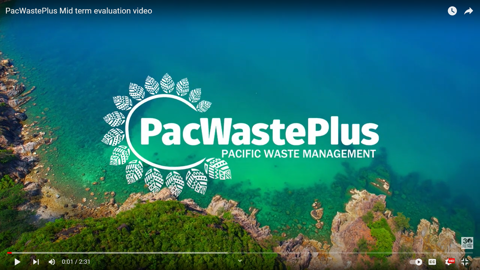Project
Assessing the current state of waste management interventions in the Pacific Islands

Project
NIRAS recently completed a mid-term evaluation of an EU-funded project in the Pacific region that is helping to tackle solid waste management challenges in 15 island nations as urban development and population growth mean a higher influx of consumer goods to the region.
The problem of waste management is a pressing one for the small island countries of the Pacific. Solid waste tends to accumulate quickly, threatening delicate ecosystems and posing great risk to the health and sanitation of communities. Limited land space also means insufficient infrastructure for the management of different waste streams. Often, the only possible way of managing waste is exporting it to other countries that have the means to recycle and dispose of it, but the freight costs are unfeasible to most Pacific public authorities.
“I think it’s good that we are recording this process of making compost. It’s not necessarily new to the Marshall Islands, we’ve been growing our own foods for a long time. But of course, not all that knowledge has been/is being passed down and new forms of knowledge are here. But I see this project as beneficial for the community. New knowledge to the compost process helps us sustain the knowledge of fertilizing our own foods and support growing our own foods.”
Majuro Waste Company, Republic of Marshall Islands, on the Benefits of PacWaste Plus
In response to these challenges, 15 countries in the Pacific region have banded together under the EU-funded PacWaste Plus programme. These countries are Cook Islands, Fiji, Kiribati, Federated States of Micronesia, Nauru, Niue, Palau, Papua New Guinea, Republic of the Marshall Islands, Samoa, Solomon Islands, Timor-Leste, Tonga, Tuvalu and Vanuatu.
PacWaste Plus began in 2019 as a continuation and expansion of the preceding PACWaste programme that assisted in the management of hazardous waste, including asbestos, e-waste and healthcare waste. Under the new programme, five more waste streams have been added, including non-hazardous waste such as organics and recyclables.
The programme is implemented by the Secretariat of the Pacific Regional Environment Programme (SPREP) with a programme management unit based in Apia, Samoa.
The PacWaste Plus website is https://www.pacwasteplus.org
Waste streams targeted:
NIRAS conducted a mid-term evaluation of PacWaste Plus throughout the first half of 2023. The evaluation employed a mixed-methods approach assessing the programme’s logic, comparing it with observed changes to evaluate its successes and failures. The intervention was assessed against 5 OECD/DAC evaluation criteria (relevance, coherence, efficiency, effectiveness and sustainability) and one EU-specific criterion, the EU-added value. Four consultants conducted remote interviews with focal points in the involved countries as well as project site visits and interviews in the Cook Islands, Marshall Islands, Papua New Guinea, Samoa, Solomon Islands and Timor Leste. One of the key experts was NIRAS employee, Luciana Capuano Mascarenhas, who has extensive environmental and solid waste experience and growing interest and knowledge of project and programme evaluations. Besides collecting and analysing data, Luciana was also in charge of coordinating the communication and dissemination activities of the evaluation according to EU visibility guidelines.
Our mid-term evaluation concluded that the PacWaste Plus programme “could not tackle all solid waste challenges in the Pacific region, but its well-coordinated cooperation with other programmes allows for comprehensive coverage of countries, waste streams and thematic sectors.”

One of PacWaste Plus’s biggest achievements has been its work on advanced recovery fees and deposits (ARFD) for recyclable materials, such as plastic bottles and aluminum cans. Under the ARFD scheme, importers are charged a small fee that is generally embedded and passed on in the sales price of certain products. This fee is refunded to the consumer upon return of the recyclable containers for recycling, and any unredeemed deposits with retailers are used to fund recovery, recycling and off-shore shipping of such materials.
“The advance recovery disposal fee scheme is one of the sustainable financial mechanisms which Cook Islands is currently looking into, and is currently the best option for us,” says Claytoncy Taurarii, acting Senior Manager for Waste Management in the Cook Islands. Through the ARFD, the island nation is able to fund the export of solid waste products to New Zealand and Australia for recycling.
The ARFD scheme has, in effect, created a shared responsibility for the management of waste from importer to consumer, providing a self-sustaining recycling incentive mechanism that is not dependent on external government funding.
Another major achievement has been the support for legislation banning imports of hazardous materials, such as asbestos. As of June 2023, 21 legislative and policy documents have been drafted under the programme, and many have already been presented to their respective countries’ parliaments for consideration.

Third from left, Luciana Capuano Mascarenhas, NIRAS Monitoring and Evaluation expert on mission in the Soloman Islands.
PacWaste Plus is an ongoing programme. As such, adjustments can be made in accordance with the results of the mid-term evaluation, which include the incorporation of longer-term strengthening of its institutional vision and the search for sustainable financing of other waste streams. Other specific findings can be found in the individual country evaluation briefs below.
Lessons Learned from the Evaluation:
Download this content in PDF form
Read the PacWaste Plus Mid-Term Evaluation Summary (EN)
Read the PacWaste Plus Mid-term Evaluation Summary (Tetum)
Read the PacWaste Plus Mid-Term Evaluation Summary (FR)
15 country briefs
Includes: project focus, local actors involved, good practices, main results achieved, lessons learned and next steps

